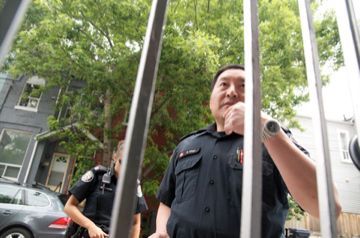STORY about SolidarityPolice/PrisonsPeace/WarMediaDirect ActionCooperatives posted on July 2, 2010 by isaac
The New Media Landscape Includes Streets Strewn with Broken Glass
The role of radical grassroots media in 2010 protest coverage
The atmosphere in the Alternative Media Centre (AMC) was like nowhere else: tense yet anticipating. Around twenty people milled about the Centre, leaving and going in either pairs or small groups so as to avoid being picked up off the streets by police.
Apprehension had increased with each new arrest being called in. A number of journalists from or associated with the AMC had already been illegally searched, arrested and even assaulted by the police. By that hour of night the police had shown that they had no issue with arresting and charging on peaceful demonstrators and accompanying journalists.
In one corner of the room discussions were already going on about bail funds for those journalists already detained.
Independent journalists that night were of a completely different stripe than mainstream reporters milling around the protests. The latter, notably from the CBC and Global TV could be seen stalking through the People First rally with muscle-bound security personell orbiting around them. A CBC Radio reporter I talked to that day had explained how his employers had hired a Federal Security Agency (FEDSEC) bodyguard to keep him safe.
The guard was an important distinguishing-point since he was there to keep the reporter safe from the demonstrators. Independent media instead had to be kept safe from the cops.
Even before the Saturday demonstration that had smashed its way through downtown Toronto had been trying the borders of rights violations. After the Get Off the Fence protest, they went into no-responsibility mode and visited the AMS. Having Media Co-op material became the grounds for seizure and arrest. Police even actively tried to keep journalists away from protesters. Detained independent journalist Amy Miller at a press conference called out police tactics of intimidation which went as far as threatening sexual assault on AMC journalists.
What the above actions by the police show is the effectiveness of real grassroots media such as the Media Co-operatives in challenging state narratives.
Even as they tried to evade police round-ups, AMC journalists were uploading a ton of footage, from by-the-minute narratives to photos and video from the front lines. Apart from covering the protests, radical media reported on the actual G20's effects on Toronto and the world. Toronto Media Co-op's (TMC) broadsheet, the Spoke, continued to be published throughout the convergence. The Vancouver Media Co-op (VMC) concurrently covered solidarity protests on the West Coast.
On a community level, TMC had an open thread about ongoing arrests during the convergence. There were also reader and activist reports about detention and arrests on the site, as well as much-needed analysis of the convergence.
Though independent journalists were harassed by police, they received kudos and even support on the streets. VMC was only the news group allowed to film within the closed ranks of the black bloc. Journalists from the AMC got exclusive access to events and people that the mainstream did not. Said journalists in turn challenged cops on illegal arrests, getting arrested themselves sometimes in the process.
The clear difference between radical and mainstream media is in motivation - the former is made up of people who put their causes of social justice before getting scoops or the organizations they work for. The radical journalist works to represent his/her community better than the mainstream.
The message from the government was clear: real independent journalists working for radical media would be as much targets for arrests and intimidation as protest organizers. The response from grassroots journalists was just as adamant: they would continue in their efforts to bring real media representation to their communities even in the face of the most heinous of police brutality.
The site for the Vancouver local of The Media Co-op has been archived and will no longer be updated. Please visit the main Media Co-op website to learn more about the organization.

Comments
The only reason the VMC was
The only reason the VMC was allowed into the "closed ranks of the black bloc" is because they're the media arm for the organization.
??
Black bloc is not an organization, idiot.
The simplest of facts....
Also, you're not ananymous
Also, you're not ananymous like the black bloc. They're anonymous in order to deal with a police state. You stay anonymous because I guess you don't like getting your feelings hurt.